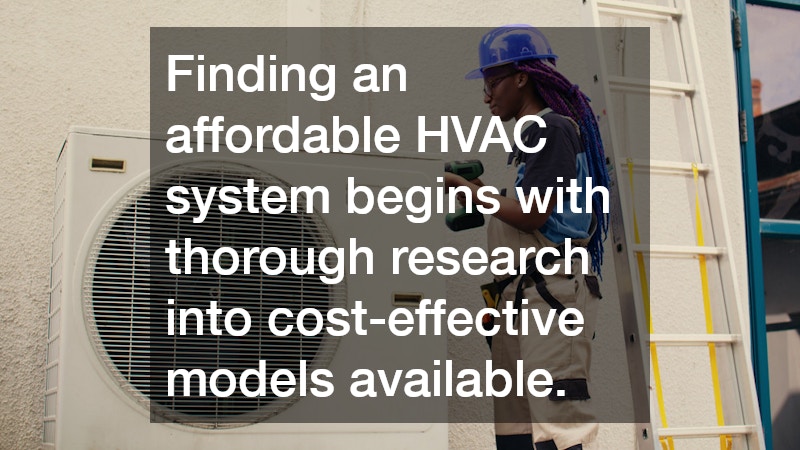
In today’s world, heating, ventilation, and air conditioning ( HVAC) systems are essential for both residential and commercial properties. However, the cost of installation, maintenance, and operation can be a significant concern for many home and business owners. This article explores various affordable HVAC options, providing insights into cost-effective models and energy-efficient upgrades.
How can I find affordable HVAC systems for my home or business?
Researching Cost-effective HVAC Models
Finding an affordable HVAC system begins with thorough research into cost-effective models available in the market. Cost-effective models include those that balance upfront costs with long-term savings on energy and repairs.
Consider factors like energy ratings, brand reliability, and any additional benefits such as warranties. Exploring customer reviews can also provide insights into real-world performance and maintenance needs.
It is also beneficial to consult with HVAC professionals who can provide expert recommendations tailored to specific property sizes and climates. This ensures that the system chosen not only fits the budget but also meets efficiency needs.
Scouting for Seasonal Discounts and Offers
Many HVAC manufacturers and retailers offer seasonal discounts or promotions. These opportunities can lead to significant reductions in the upfront costs of an HVAC system, enabling more affordable options for consumers.
Timing the purchase during promotional periods such as summer sales or end-of-year clearance can yield higher savings. Customers are encouraged to keep an eye on announcements and develop relationships with local retailers for insider tips on upcoming deals.
Some companies also provide bundled packages that include additional services like maintenance for the first year, which further enhances the value for money. By taking advantage of these offers, buyers can maximize their investment over time.
What are the benefits of energy-efficient HVAC systems?
Reduction in Energy Costs
Energy-efficient HVAC systems are designed to consume less power without sacrificing performance. This leads to noticeable savings on monthly utility bills, making them an economically smart choice over time.
According to Energy Star, energy-efficient systems can cut about 20% off heating and cooling costs. Over the life of the system, these savings can substantially outweigh any higher initial costs.
The investment in energy-efficient HVAC systems is also a hedge against rising energy costs, providing financial predictability for both homes and businesses. This predictability can greatly benefit long-term budget planning.
Environmentally Friendly Solutions
Energy-efficient systems reduce the reliance on fossil fuels, leading to fewer carbon emissions. This contributes significantly to reducing the environmental footprint of residential and commercial buildings.
Eco-friendly refrigerants not only lower emissions but also improve the overall efficiency and longevity of the system. These refrigerants are designed to meet international environmental standards while providing effective heating and cooling solutions.
Moreover, environmentally conscious choices in HVAC systems can enhance property values and appeal to eco-aware buyers or renters. This makes choosing a green system both a responsible and economically beneficial decision.
Are there government incentives or grants for installing affordable HVAC systems?
Understanding Available Government Programs
Various government programs offer grants, rebates, or tax credits to incentivize energy-efficient HVAC installations. These initiatives aim to encourage energy conservation while easing the financial burden on property owners.
Programs like the federal Residential Energy Efficiency Tax Credit support modernization efforts by refunding a percentage of the total installation costs. These tax credits are an opportunity to make significant savings when upgrading the HVAC system.
State and local governments may offer additional incentives that can further reduce net costs, ensuring broader affordability. Each incentive program usually outlines specific eligibility criteria, requiring a thorough review before application.
Navigating Application Processes
Successfully applying for government incentives requires understanding eligibility criteria and documentation processes. Most programs necessitate detailed documentation of system specifications, purchase details, and installation reports.
Applicants should ensure all paperwork is complete and accurately filled to avoid processing delays or rejection. Engaging with a knowledgeable contractor can ease navigation of these processes while ensuring maximization of available benefits.
Being proactive in learning about deadlines for application submissions is crucial. Early application increases the chances of securing funds, which are often provided on a first-come, first-served basis.
Affordable HVAC solutions are within reach for both homeowners and business operators willing to invest time in research and take advantage of existing incentives. By choosing energy-efficient systems, individuals not only reduce costs but also contribute to environmental conservation.






